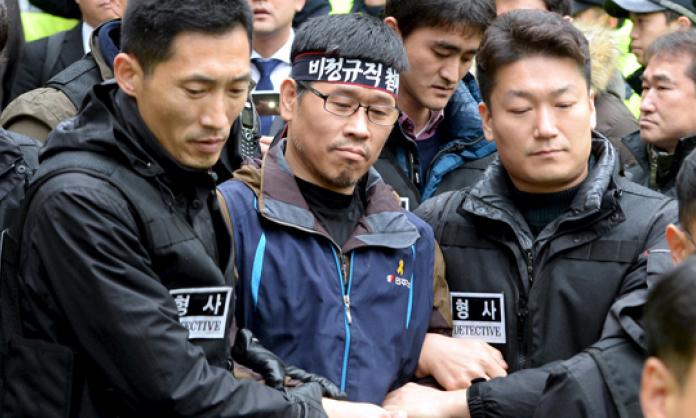More than 410 trade unionists have been targeted in South Korea, as the Park Geun-hye government continues to crack down on workers and organised labour.
Among those arrested are nine members and officials belonging to the Korean Public Transport Union and five officials from the Korean Construction Workers Union. On 10 December, South Korean police also arrested the president of the Korean Confederation of Trade Unions (KCTU), Han Sang-gyun, charging him with sedition.
Han had sought sanctuary in the Jogyesa Buddhist temple in Seoul on 16 November after he was targeted for arrest. The trade union leader was arrested only after he agreed to leave the temple to prevent it being attacked by police.
He is the first person to be charged with sedition since 1986. Sedition charges were regularly used against democracy, civil rights and labour activists during the military dictatorship of Park Geun-hye’s father, Park Chung-hee, between 1961 and 1979, and during the subsequent 1980-87 military dictatorship of Chun Doo-hwan, who seized control after Park’s assassination.
The new crackdown on the organised labour movement is an attempt to silence opposition to new pro-business labour laws being proposed by Park’s ruling Saenuri (New Frontier) Party.
According to the KCTU, the proposed laws would make wages dependent on performance, making it easier for South Korea’s chaebol corporations (state-backed family-run conglomerates) to fire workers.
The laws would also provide “flexibility” for both South Korean and foreign corporations to increase the number of part time “irregular” or “temporary” workers, undermining job security and permanency.
Currently, irregular or temporary workers make up almost 22 percent of the country’s workforce. The average in other industrialised countries is 14 percent. South Korea’s non-permanent workers on average earn only 54 percent of permanent workers’ wages.
Park has used South Korea’s soaring youth unemployment to justify her attack.
But in a November Foreign Policy in Focus interview, Han explained that if the laws pass, “an employer can hire young workers for four years, fire them temporarily, then rehire them for another four years.
“This means that they would have no reason to hire permanent, regular workers, and it would simply be a matter of time before the entire labour force in South Korea becomes irregular or precarious.”
Han explained that under current laws, companies can change employment contract conditions only through negotiation with workers and their unions. Under the new laws, this would no longer be the case.
“If this passes, a worker can lose his/her job or have his/her wages docked simply for falling out of favour with his/her employer, and there would be no reason for the employer to listen to the demands of a labour union”, he said.
“This would create a slavery-like work environment where workers constantly have to curry favour with their boss. This is designed to eliminate all means of resistance by organised labour, which is precisely the aim of the Park Geun-hye government.”
In response to the proposed labour laws, the KCTU, along with 50 other organisations, organised a series of mass anti-government rallies. The largest took place on 14 November and drew up to 130,000 in Seoul. Many of these demonstrators were also protesting Park’s attacks on democratic and civil rights.
Since being elected in 2013, Park has used national security laws from 1948 to jail opposition lawmakers and to dissolve the largest social democratic opposition party in the country, while also cracking down on the labour movement and anti-government protests.
The mass street protests have also been fuelled by outrage at Park’s attempt to re-introduce government-issued textbooks, replacing privately published textbooks. Academics, democracy and civil rights activists have accused her of attempting to whitewash her father’s brutal military regime and to rewrite South Korean history.










